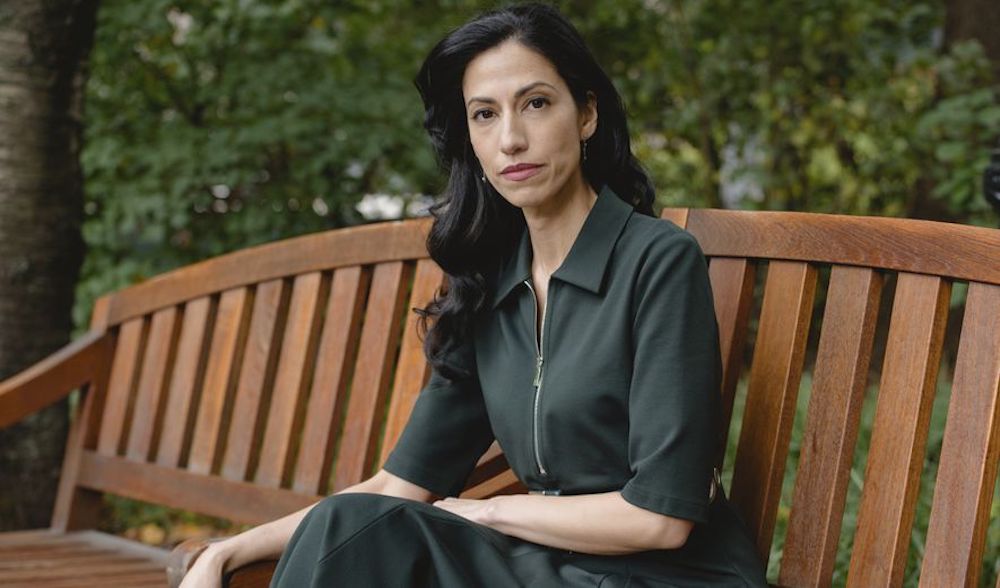ANDREA PLATE WRITES — American women know well the indignity of being defined, and best-known, by the men they marry. But Huma Abedin, author of the utterly readable, just published memoir And/Both: A Life in Many Worlds (Scribner), is no ordinary woman; nor did she marry a nice ordinary man, to say the least; she is now divorced.
Stunning and statuesque, this Washington, D.C. doyenne of Southeast Asian descent served Hillary Clinton first in 1998, as a White House intern—about one year after Monica left— then steadily rose to an illustrious array of positions in what she calls “Hillaryland:” aide and personal advisor to Clinton’s 2000 New York senatorial campaign; Deputy Chief of Staff in the State Department; vice-chairperson of her failed 2016 run for the Presidency; and trusted personal advisor. She also emerged as a kind of FOB deluxe—a friend of both Bill’s and Hillary’s.
Much of that time she was married to Anthony Weiner–the disgraced former Democratic Congressman known on Twitter as “Sidney Danger,” who served 22 months in federal prison for sexting with an underaged girl. Lest anyone forget, it was Weiner’s emails, found on his wife’s laptop, which prompted then FBI Chief James Comey to reopen that fateful investigation into Hillary’s emails, a confused and confusing political circus which might well have helped toss the 2016 Presidential election to Donald Trump.
It gets worse. Abedin, the American-born daughter of an Indian father and Pakistani mother— both academicians held in high esteem—is a devout Muslim. She writes: “In all the years of Islam classes, one of the lessons repeated over and over again was that slander, gossip and exploiting people’s personal weaknesses are among the worst forms of conduct for any Muslim.” Welcome to America, Huma.
Never mind the whispering, the pointed fingers, the stares on the street. More hurtful by far, she says, was the assault waged by the American press, and the subsequent lynching of a headline hungry public. This is a woman who drowned—almost— in a tidal wave of scurrilous newspaper headlines (“Weiner Roast;” “Naked Truth”); who once fled her home in the trunk of a car driven by a friend to escape a media scrum; who took hurtful calls from parents canceling playdates for the son whom she and Weiner share; and who retreated home, having been told, by charitable organizations, that they didn’t want to sully their reputations with the couple’s donated time. Can you blame her for contemplating suicide?
Add to that the disparagement of being dubbed “an Arab;” warned by strangers on street corners to love or leave America; and accused of being in the Muslim Brotherhood — by five conservative members of Congress (including Minnesota’s Michelle Bachman). Abedin herself had to wonder, at times: What’s a girl like me doing in a place like this? In December of 1998, at an advance meeting with members of the Israeli Foreign Ministry for what would later become President Clinton’s historic trip to Israel and Gaza, she was, sadly, struck by the string of place cards on her side of the negotiating table bearing names that were nearly all Jewish: Engelberg, Steinberg, Rosenthal, Shamir, Meyer, Stein—and Abedin. She writes, drolly: “As a Muslim and an American even here in the Middle East, my home turf, I remained a minority.”
She remained, too, caught between cultures: Raised in Saudi Arabia but weaned by her parents on Western feminist ideals. Schooled in Islam, then educated at George Washington University. Mindful of the Qu’ran but discontented with conventional domesticity. Publicly adventuresome but privately chaste-until age thirty (enter Anthony). Lover of Western fashion and style—blowouts, stilettos, Oscar de la Renta—but comfortable wearing traditional Middle Eastern garb (In one instance, she writes, her newly issued government pager kept beeping “beneath all the brightly colored silk and chiffon” worn to a traditional Middle Eastern wedding. The dress was ruffled, but not Abedin).
To be fair, Abedin tries hard to find humor, even in pain. In a grocery store checkout line, she recalls, a woman pointed to a tabloid featuring the glamorous, Lebanese-born Amal Clooney, and asked: “Is that you?” Finally, she could laugh. What’s more, even in the darkest days, she found light. “I was proud to serve a country,” she explains, “that gave my family the freedoms and opportunities they couldn’t possibly have had anywhere else.”
Readers who like stories about strong women’s struggles—and weaknesses— will enjoy this literary romp through Abedin’s hills and dales. One must forgive her fawning loyalty to HRC- “I embarked on a career in public service inspired by working alongside an American icon-” and try to see past the seemingly belligerent faith she held in her husband for too long. But while Abedin may have been privately blind in love, one clear theme shines through in this 500 plus-paged account of life in the fast lane of American politics: her love of country, and public service, which is undying.
ANDREA PLATE is a part-time lecturer in LMU’s Department of Sociology, the author of three books, including one on the U.S. Veterans Administration, and a U.S. Vets Initiative board member.

